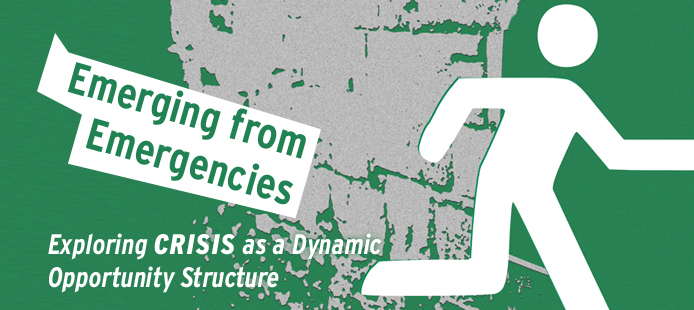Main Content
Emerging from Emergencies. Exploring CRISIS as a Dynamic Opportunity Structure
International and Transdisciplinary Virtual Conference

Crisis has become a striking and increasingly pervasive feature of the present state of the world. In the most recent past, BREXIT, refugee migration, climate change and COVID-19 mark only the most prominent examples of complex settings in which existential threat forces manifold organisations and political bodies to respond. A crisis is no objectively measurable state of affairs. Rather, it emerges, often surprisingly, if a situation is framed as featuring high degrees of uncertainty, urgency and threat by a significant share of the public (Boin, t’Hart & McConnell 2009). A shared perception crisis has the capacity to entirely change the character of a situation and to turn decision makers into involved participants who become entangled with an escalating course of events (Rosenthal & Kouzmin 1997, p. 286). A crisis diagnosis has thus strong performative qualities. The “tipping point” (Boin, t’Hart & McConnell 2009) from normal to crisis cannot be determined in advance.
An essential feature of today’s time is that crises seem to be less caused by singular events and instead are driven by inherently uncertain, if not disruptive environments (Hällgren, Rouleau & de Rond 2018). Against this background, the crisis experience has turned from an isolated, “low probability/high consequences event” (Weick 1988: 305) into a rather pervasive experience expanding in time, across spatial borders as well as sectoral and organisational boundaries (Ansell & Boin, 2019). Moreover, crises are increasingly examined from a process perspective situating crisis management at different stages of this process and exploring questions of individual and collective resilience (Williams, Gruber, Sutcliffe, Shepperd & Zhao 2018). In such a setting, the governance of crisis, in the sense of a professional crisis management alone will no longer do. What becomes necessary are novel and complex forms of governance with crisis that are just about to emerge. The overarching aim of the conference is to explore core aspects of these new forms of collective action in crisis. The conference concludes a four-year inter- and transdisciplinary research project entitled “Coping with crises in a resilient manner: The role of expert advice in the creation and use of opportunities in crisis situations (RESKIU)” funded by the German Ministry of Education and Research (2017-2021).

